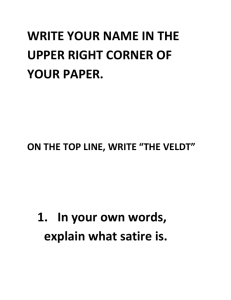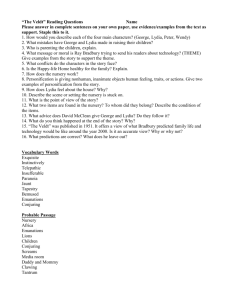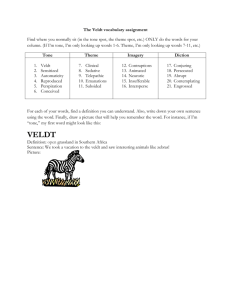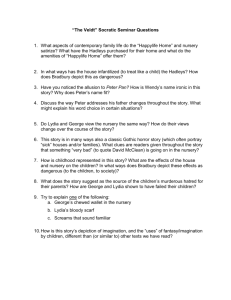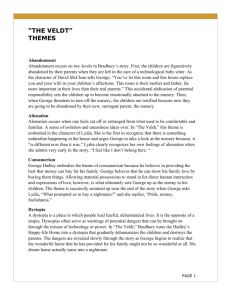“The Veldt”
advertisement
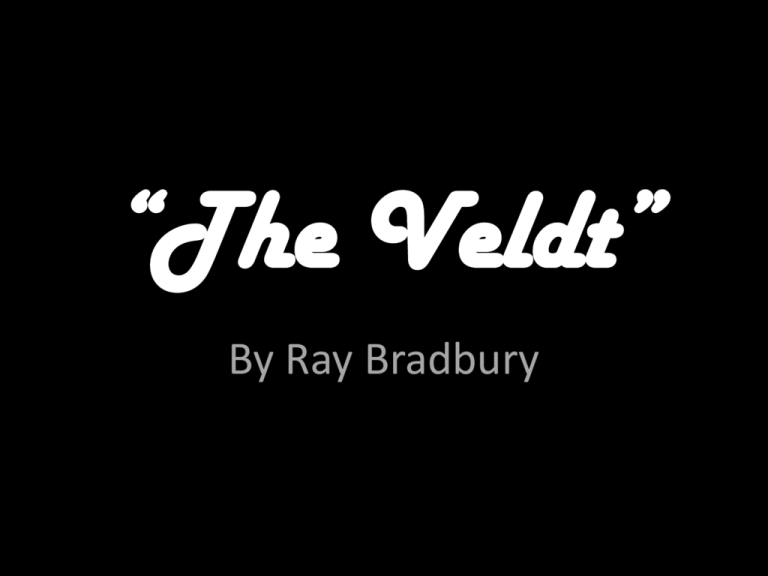
“The Veldt” By Ray Bradbury What does it mean to “Enable” someone’s behavior? http://www.youtube.com/watch?v=ss_qYVAsdSk&safety_mode=true&persist _safety_mode=1&safe=active http://www.youtube.com/watch?v=TIeCUvvbQaI&safety_mode=true&persist _safety_mode=1&safe=active Create your own definition for Enabling: • On your slip write what you think enabling is. • Be prepared to share. • I will collect this slip. Reader’s Theater with “The Veldt” • • • • • • • Mom Dad Wendy Peter Narrator # 1 Narrator # 2 Narrator # 3 Bell Ringer: ‘TheVeldt’ Review • Describe the kind of home the Hadleys live in. • What is the “Veldt”? How is it relevant to the story? • Describe the children’s relationship with their parents. The Veldt By: Ray Bradbury Issues for Discussion: • What is the central conflict or problem in this story? • What is the main cause of the problem? • Who (or what) do you hold responsible? Discussing Writer’s Craft: • What is the significance of the children’s names? • What is the author’s purpose in writing this text? Use of Foreshadowing: • Think about your original reading of the text. Did you predict the final outcome of the story? • Now, return to the text and find as many examples of foreshadowing as you can. – Write your examples down on a piece of paper. • • • • • • 1. What is the central conflict or problem in this story? 2. What is the main cause of the problem? 3. Who (or what) do you hold responsible? 4. What is the author’s purpose in writing this text? 5. What is the significance of the children’s names? 6. How did the parents in this story enable their children’s behavior? Give an example from the text. • 7. Return to the text and find as many examples of foreshadowing as you can. You need at least three examples. Remediation Exam for Cask of Amontillado • You can only take the test during tutoring hours. • No notes, or text. • You will receive a new test. Deadline? Find Evidence for both Sides! Parents: Technology: Textual Evidence: Textual Evidence: 1. “All-right if they’ll just shut up” George says and let’s them go into the nursery one last time. 2. 3. 4. 5. 6. 1. The nursery doesn’t follow the father’s orders to turn into ‘Aladdin’. Proving the technology has a mind of its own. 2. 3. 4. 5. 6. The Veldt Analysis • The cause of Wendy and Peter’s negative attitude in the “The Veldt” by Ray Bradbury is: • Choose one: Technology OR Parents The Veldt Analysis Introduction: Thesis One Body Paragraph: Topic sentence -Textual Support (3 examples) Conclusion: -Make a connection -Closing Idea My Example: Veldt Analysis Planning Introduction: The root cause of the children’s behavior and actions in the Veldt is their parents. George and Lydia’s lack of discipline led their children to become disrespectful and ultimately, deadly. Support: 1. . “I wouldn’t want the nursery locked up, ever!” he snaps. 2. Peter states, “I don’t think you better consider it any more, father” when discussing getting rid of the nursery all together. 3. Lastly, when the children beg for a last hurrah in their nursery George gives in by saying “Oh alright-if they’ll just shut up.” My Example: Veldt Analysis The root cause of the children’s behavior and actions in the Veldt is their parents. George and Lydia’s lack of discipline led their children to become disrespectful and ultimately, deadly. In The Veldt, George and Lydia allow their ‘Happy Life Home’ take on their own parenting responsibilities. The children view the home as the caregiver, not the parents. In turn, the children stop viewing the parents as authority figures. In the children’s eyes, they are now obstacles. For instance, when the father suggests that they might close the nursery, Peter becomes defensive. “I wouldn’t want the nursery locked up, ever!” he snaps. George then relents and allows Peter to play in the virtual Africa. This exchange makes it clear to Peter that his father is easily manipulated. Peter even displays a threatening tone towards his father without consequence. Peter states, “I don’t think you better consider it any more, father” when discussing getting rid of the nursery all together. There is no punishment given for this menacing threat. Instead, Peter is sent to back to the place he wants to be; the nursery. Lastly, when the children beg for a last hurrah in their nursery George gives in by saying “Oh alright-if they’ll just shut up.” This is a parent who is a chronic doormat in his own home. My Example: Veldt Analysis In conclusion, children need boundaries. The parents are clearly to blame for their own deaths. Yes, they provided them with the technology, but they failed to provide them with a moral compass as well. For example, many teenagers are glued to their electronics to the point of obsession. The parents are responsible for enforcing limits on all facets of life. Maybe all children don’t have access to a ‘Happy Life Home’, but they’ll always need someone to tell them “no”. My Example: Veldt Analysis The root cause of the children’s behavior and actions in the Veldt is their parents. George and Lydia’s lack of discipline led their children to become disrespectful and ultimately, deadly. In The Veldt, George and Lydia allow their ‘Happy Life Home’ take on their own parenting responsibilities. The children view the home as the caregiver, not the parents. In turn, the children stop viewing the parents as authority figures. In the children’s eyes, they are now obstacles. For instance, when the father suggests that they might close the nursery, Peter becomes defensive. “I wouldn’t want the nursery locked up, ever!” he snaps. George then relents and allows Peter to play in the virtual Africa. This exchange makes it clear to Peter that his father is easily manipulated. Peter even displays a threatening tone towards his father without consequence. Peter states, “I don’t think you better consider it any more, father” when discussing getting rid of the nursery all together. There is no punishment given for this menacing threat. Instead, Peter is sent to back to the place he wants to be; the nursery. Lastly, when the children beg for a last hurrah in their nursery George gives in by saying “Oh alright-if they’ll just shut up.” This is a parent who is a chronic doormat in his own home. My Example: Veldt Analysis Connection In conclusion, children need boundaries. The parents are clearly to blame for their own deaths. Yes, they provided them with the technology, but they failed to provide them with a moral compass as well. For example, many teenagers are glued to their electronics to the point of obsession. The parents are responsible for enforcing limits on all facets of life. Maybe all children don’t have access to a ‘Happy Life Home’, but they’ll always need someone to tell them “no”. Closing Idea Veldt Analysis Planning Sheet • Front side: Rough Draft and Planning • Back side: Final draft written neatly in blue or black ink. The Veldt Analysis Requirements Introduction: Thesis One Body Paragraph: Topic sentence -Textual Support (3 examples) Conclusion: -Make a connection -Closing Idea You are graded on your ability to support your thesis with textual evidence and persuade an audience. “The Veldt” Movie Poster: • Movie posters are designed purposely to create an effect for the viewer. • The images use color connotation, symbolism, font style, layout, tag lines, etc. to create these effects. “The Veldt” Movie Poster: • Your poster must include… – The title and author (“The Veldt” by Ray Bradbury) – An appropriate tag line – At lease three symbols or images – Appropriate color connotation – Appropriate font choice – A viewer rating and reason – Names of director and star actors – Complete and detailed design “The Veldt” Movie Poster: • Your poster must include… – The title and author – An appropriate tag line – At lease three symbols or images – Appropriate color connotation – Appropriate font choice – A viewer rating and reason – Names of director and star actors – Complete and detailed design
